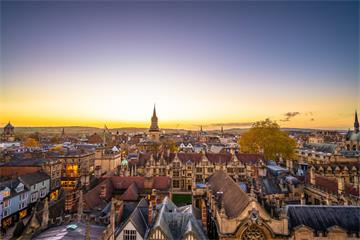Oxford BRC to be given Freedom of Oxford

The NIHR Oxford Biomedical Research Centre (BRC) is to be given the Freedom of the City of Oxford.
The award is the highest honour Oxford City Council can bestow and has previously been given to dignitaries including Oxfam, Nelson Mandela, authors Philip Pullman and Colin Dexter, and Sir Roger Bannister.
The Oxford BRC and Baroness Frances O'Grady, the former General Secretary of the Trade Unions Council (TUC), will be conferred the Freedom of the City at a council meeting on 30 January. They will be formally presented with their Freedom of the City of Oxford scrolls at a ceremony later in the year.
The Oxford BRC, part of the National Institute for Health and Care Research (NIHR), was established in 2007 and is a partnership between Oxford University Hospitals (OUH) NHS Foundation Trust and the University of Oxford. It brings together academics and clinicians to translate scientific breakthroughs into potential new treatments, diagnostics and medical technologies that benefit NHS patients.
As well as the development of the Oxford-AstraZeneca COVID-19 vaccine, the BRC led the way in identifying potential treatments for severe COVID-19 and mapping the immune response to the virus.
Beyond the pandemic, its researchers have played an important role in transforming the way we treat stroke, cardiovascular disease, cancer, infectious diseases and many other diseases. The BRC is a leading centre in new technologies such as gene and cell therapy, digital health, artificial intelligence and the use of clinical informatics.
Professor Helen McShane, Director of the Oxford BRC, said: "I am delighted and honoured to accept the Freedom of the City of Oxford on behalf of the NIHR Oxford Biomedical Research Centre.
"Ours is a partnership that brings together the very best in academic healthcare research and NHS clinical excellence, and a key element in the thriving clinical academic ecosystem in this city. An important element in our success is the people of Oxford, who participate in great numbers in our clinical trials and are increasingly involved in the research that we do, helping us to push forward the boundaries of diagnostics, treatment and care – and to ensure our research responds to the needs of the populations we serve.
"The success of our BRC is inseparable from the fertile environment in which it is located, and this recognition belongs to the whole city."
Councillor Louise Upton, Cabinet Member for Health and Transport, will propose the conferment of the Freedom of the City of Oxford on Oxford BRC. She said: "We bestow the Freedom of the City of Oxford on people who have touched or changed lives locally and globally, whether that be the humanitarian aid work of Oxfam or writing novels that bring joy to people all over the world.
"The researchers and developers at the Oxford Biomedical Research Centre saved more than six million lives by producing the Oxford-AstraZeneca Covid-19 vaccine, and their work across many other diseases has had and will continue to have a huge and beneficial impact on patients, both in Oxfordshire and nationally. Their success is intertwined with the residents of our city, many of whom have volunteered to be part of clinical trials, including for the Covid vaccine.
"I can think of no organisation in Oxford who deserves this award more, and I am hugely proud to say I live in a city alongside these brilliant and dedicated people."
The Freedom of the City of Oxford title is honorary and does not have any rights attached to it other than to attend formal Council meetings.




























































